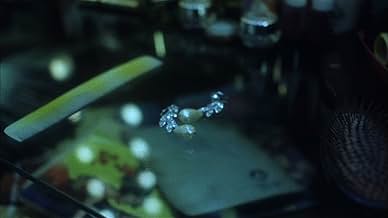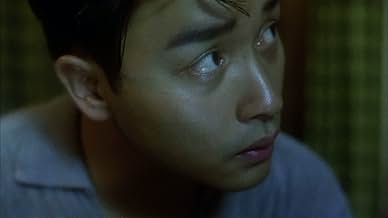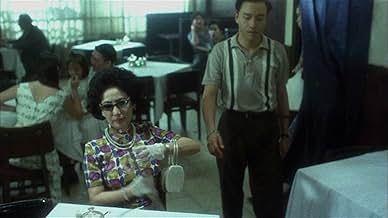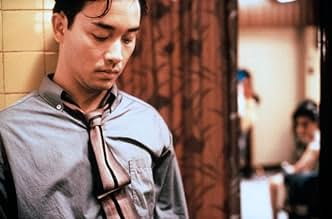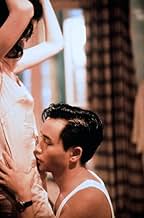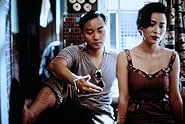NOTE IMDb
7,4/10
27 k
MA NOTE
Un homme essaie de découvrir qui est sa vraie mère après que la femme qui l'a élevé lui raconte la vérité.Un homme essaie de découvrir qui est sa vraie mère après que la femme qui l'a élevé lui raconte la vérité.Un homme essaie de découvrir qui est sa vraie mère après que la femme qui l'a élevé lui raconte la vérité.
- Réalisation
- Scénario
- Casting principal
- Récompenses
- 17 victoires et 9 nominations au total
Rebecca Pan
- Rebecca
- (as Tik-Wa Poon)
Tony Leung Chiu-wai
- Chow Mo-wan
- (as Tony Chiu Wai Leung)
Avis à la une
In Wong Kar-wai's 1991 film Days of Being Wild, Yuddy (Leslie Cheung), a charming drifter captures the attention of store attendant Su Lizhen (Maggie Cheung) by asking her to look at his watch. When she sees that it says one minute before 3:00PM on April 16, 1960, he tells her that she will never forget the moment and will dream about him that night. The next time they meet, the moment becomes two, then one hour, then weeks and months but Yuddy is like the mythical bird with no legs that just flies and flies and never lands. Abandoned by his real mother and brought up by a wealthy alcoholic courtesan (Rebecca Pan), he does not know where he came from or where he is going. He treats women with little respect, discarding them when they no longer serve his purpose. When one lover asks him if he loves her, he tells her that during his life he will be friends with many, many women but won't know whom he truly loves until the end.
Days of Being Wild unfolds like a dream with color filters, unusual shadows, and the sights and sounds of Hong Kong's rainy nights and sweltering summers. Based on the director's memories from his childhood and admiration for the style of Argentinean novelist Manuel Puig (Heartbreak Tango), the film is a series of episodes involving six people who touch each other's lives. After his short-lived relationship with Su, Yuddy meets a cabaret dancer who calls herself Mimi (Carina Lau) but their relationship fares no better and she is left to suffer the consequences of their breakup. Meanwhile, Su meets Tide (Andy Lau), a gentle policeman whom she is able to confide until he suddenly leaves Hong Kong to become a sailor. Each character seeks a sense of identity and fulfillment. After Rebecca tells him of her plans to move to America with her boyfriend, she finally lets him know who and where his real mother is. After Yuddy goes to the Philippines to try to find his mother, the lives of the main protagonists come together in a powerful conclusion.
Days of Being Wild may sound like a soap opera but the film reaches a much higher artistic level. Supported by outstanding performances by Leslie Cheung, Maggie Cheung, and Jacky Cheung as Yuddy's only friend Zeb, it is a tone poem about longing and one's search for identity. We care about the characters even though they don't seem to care about themselves. Like many of us, they pine for the things that might have been, the word that was never said, and the love that remains elusive. A commercial failure but an artistic triumph, Days of Being Wild is a moody, atmospheric film that with its background of popular music, in this case 1950's rumbas and cha-cha's, forecasts the director's later In the Mood For Love. As a beautifully realized example of alienated people desperately seeking their place in the world, however, it stands securely on its own.
Days of Being Wild unfolds like a dream with color filters, unusual shadows, and the sights and sounds of Hong Kong's rainy nights and sweltering summers. Based on the director's memories from his childhood and admiration for the style of Argentinean novelist Manuel Puig (Heartbreak Tango), the film is a series of episodes involving six people who touch each other's lives. After his short-lived relationship with Su, Yuddy meets a cabaret dancer who calls herself Mimi (Carina Lau) but their relationship fares no better and she is left to suffer the consequences of their breakup. Meanwhile, Su meets Tide (Andy Lau), a gentle policeman whom she is able to confide until he suddenly leaves Hong Kong to become a sailor. Each character seeks a sense of identity and fulfillment. After Rebecca tells him of her plans to move to America with her boyfriend, she finally lets him know who and where his real mother is. After Yuddy goes to the Philippines to try to find his mother, the lives of the main protagonists come together in a powerful conclusion.
Days of Being Wild may sound like a soap opera but the film reaches a much higher artistic level. Supported by outstanding performances by Leslie Cheung, Maggie Cheung, and Jacky Cheung as Yuddy's only friend Zeb, it is a tone poem about longing and one's search for identity. We care about the characters even though they don't seem to care about themselves. Like many of us, they pine for the things that might have been, the word that was never said, and the love that remains elusive. A commercial failure but an artistic triumph, Days of Being Wild is a moody, atmospheric film that with its background of popular music, in this case 1950's rumbas and cha-cha's, forecasts the director's later In the Mood For Love. As a beautifully realized example of alienated people desperately seeking their place in the world, however, it stands securely on its own.
This film was directed by the Chinese director, Wong Kar-Wai, who came to Western attention through his strange and quirky CHUNGKING EXPRESS. Because it was such an unusual and unique film, I decided to watch this other film. And, as in CHUNKING EXPRESS, DAYS OF BEING WILD was indeed a very unusual film--though with none of the kooky sensibilities of the other movie.
The film begins with a man trying to slowly ingratiate himself to a rather shy lady. Slowly but surely he is able to bring her out of her shell and after months of grooming her, he is able to bed her. To him, it's all a game and he has absolutely no regard for her or any other woman. But this nice lady is shattered and he could care less. Later, you see him pretty much doing the same thing in another self-centered relationship. While this is moderately interesting, what makes it even more so is his relationship with his foster mom. Their sick and dysfunctional interactions tell much about why he is who he is. The rest of the film concerns both of them as they separate and go their ways.
The DVD case compared this movie to the French film, LA RONDE. In most ways, this is very unfortunate, as both movies are excellent on their own and Wong Kar-Wai's film is not derivative. The only major similarities I saw is that both films involved sex and also showed how the two people at the beginning later had impact on others' behaviors as well. LA RONDE was about a large group of people and how sex (and an STD) unites them, while DAYS OF BEING WILD is about connections--and how some are unable to have deep or meaningful relationships. In this sense, it's a standout film. However, unfortunately, this also makes it a rather unpleasant film and is a bit difficult to watch--definitely NOT a date movie! It simply is NOT a fun film. But for someone who wants something with insights and is well directed and written, this is a film well worth seeing.
NOTE--While this film is about sexuality and the DVD case looks very steamy, there is no nudity in the film. This actually might be an excellent film for teens to see with their parents, as it opens up a great opportunity to talk about intimacy and sexuality--and how some cannot or will not combine the two.
The film begins with a man trying to slowly ingratiate himself to a rather shy lady. Slowly but surely he is able to bring her out of her shell and after months of grooming her, he is able to bed her. To him, it's all a game and he has absolutely no regard for her or any other woman. But this nice lady is shattered and he could care less. Later, you see him pretty much doing the same thing in another self-centered relationship. While this is moderately interesting, what makes it even more so is his relationship with his foster mom. Their sick and dysfunctional interactions tell much about why he is who he is. The rest of the film concerns both of them as they separate and go their ways.
The DVD case compared this movie to the French film, LA RONDE. In most ways, this is very unfortunate, as both movies are excellent on their own and Wong Kar-Wai's film is not derivative. The only major similarities I saw is that both films involved sex and also showed how the two people at the beginning later had impact on others' behaviors as well. LA RONDE was about a large group of people and how sex (and an STD) unites them, while DAYS OF BEING WILD is about connections--and how some are unable to have deep or meaningful relationships. In this sense, it's a standout film. However, unfortunately, this also makes it a rather unpleasant film and is a bit difficult to watch--definitely NOT a date movie! It simply is NOT a fun film. But for someone who wants something with insights and is well directed and written, this is a film well worth seeing.
NOTE--While this film is about sexuality and the DVD case looks very steamy, there is no nudity in the film. This actually might be an excellent film for teens to see with their parents, as it opens up a great opportunity to talk about intimacy and sexuality--and how some cannot or will not combine the two.
Though it has been argued that 'A Fei Zheng Chuan' (aka 'Days of Being Wild') is the first set of the trilogy which is completed by 'Fa Yeung Nin Wa' (aka 'In the Mood For Love') and '2046', it 'looks' different from the other two films. Kar Wai uses less colour, more shadow, rain and heat and more rawness. The tone is much darker than in 'Fa Yeung Nin Wa' as the film is set in the 50s. The music is beautiful and effectively used. And, here too Kar Wai ends up making a powerful product. Though this film was a box office failure, it is an artistic victory.
'A Fei Zheng Chuan' tells the story of 6 individuals whose lives are interconnected by each character's search and struggle for an identity. It's about loneliness, unrequited love, lost love, the search for love, and how the search continues. Kar Wai clevely brings up the theme of sex (without showing any nudity). The writing is excellent and the characterization is strengthened by superb and unique performances. The late Leslie Cheung's Yuddy is not a very likable person but we do sympathize with this man and recognize him. Maggie Cheung as Su gives one of the most subtle and finest performances. Carina Lau is energetic and terrific as Mimi. Rebecca Pan gracefully downplays her part. Andy Lau's Tide and Jacky Cheung's Zeb too are relatable and the actors are nothing short of remarkable. Actually, I recognize all the characters in this film.
I loved the cinematography, especially the long shots. One of my favorite shot is the introduction of the scene that glides from the Phillipine streets to Yuddy and Tide in a lunch bar. This is one fine example of skillful camera-work. The shaky camera (which thankfully isn't overdone) and the close-ups that mostly take place during conversations and intimate moments between two characters work very well. Doyle's camera-work simply guides us through the lives of these characters.
Summing it up, 'A Fei Zheng Chuan' works on many levels. It is an excellent study of characters, it 'tells' a universal story in a poetic way and it is a fine cinematic experience.
A bird that never lands will one day suddenly seize to exist.
'A Fei Zheng Chuan' tells the story of 6 individuals whose lives are interconnected by each character's search and struggle for an identity. It's about loneliness, unrequited love, lost love, the search for love, and how the search continues. Kar Wai clevely brings up the theme of sex (without showing any nudity). The writing is excellent and the characterization is strengthened by superb and unique performances. The late Leslie Cheung's Yuddy is not a very likable person but we do sympathize with this man and recognize him. Maggie Cheung as Su gives one of the most subtle and finest performances. Carina Lau is energetic and terrific as Mimi. Rebecca Pan gracefully downplays her part. Andy Lau's Tide and Jacky Cheung's Zeb too are relatable and the actors are nothing short of remarkable. Actually, I recognize all the characters in this film.
I loved the cinematography, especially the long shots. One of my favorite shot is the introduction of the scene that glides from the Phillipine streets to Yuddy and Tide in a lunch bar. This is one fine example of skillful camera-work. The shaky camera (which thankfully isn't overdone) and the close-ups that mostly take place during conversations and intimate moments between two characters work very well. Doyle's camera-work simply guides us through the lives of these characters.
Summing it up, 'A Fei Zheng Chuan' works on many levels. It is an excellent study of characters, it 'tells' a universal story in a poetic way and it is a fine cinematic experience.
A bird that never lands will one day suddenly seize to exist.
Kar Wai Wong's 2nd feature film is considerably more abstract than his first "As Tears Go By". so if you're looking for a good first Kar Wai Wong film to watch, you should probably start there.
"Days of Being Wild" reminded me very much of the classic French book "The Stranger" by Albert Camus; in fact I wonder if Kar Wai Wong may have been influenced by that book. Both stories center around a young man who is very unemotional except at times of explosive violence. Both stories show the young man to have severe mommy issues, i.e. a disconnection from his mother resulting in never learning how to show love and caring. And in both stories, the main character follows a very existentialistic path in life. He goes wherever life may take him with no connection to people or places.
The main character is not very likable. In fact he's a downright jerk toward women. But this ties in with the story of him trying to find his mother who abandoned him when he was a child. At the same time we see the interweaving of 4 other characters: 2 girlfriends, 1 devoted friend who falls for one of the girlfriends, and a policeman who enters the story by chance. Oh yeah, there's also the young man's rich aunt (adoptive mother) and a string of men she keeps.
It may be tough keeping up with all the characters, especially when the story starts moving to different locations. Certain events may seem random, but in the end it all comes together with a very poetic thought.
If you're a cinema geek, you'll love this film for its sheer technical achievements. A lot of scenes are shot with reflections & mirrors, allowing us to see the faces of different people simultaneously (without the camera jumping back & forth to whoever is talking). For example, the camera may be on a woman while she talks to a man. He is in front of the camera with his back to us, but we see his face & expressions in the reflection of a bathroom mirror behind the woman. Yea, I'm a cinema geek so I love stuff like that. If you like little details, you'll have a great time watching "Days of Being Wild".
"Days of Being Wild" reminded me very much of the classic French book "The Stranger" by Albert Camus; in fact I wonder if Kar Wai Wong may have been influenced by that book. Both stories center around a young man who is very unemotional except at times of explosive violence. Both stories show the young man to have severe mommy issues, i.e. a disconnection from his mother resulting in never learning how to show love and caring. And in both stories, the main character follows a very existentialistic path in life. He goes wherever life may take him with no connection to people or places.
The main character is not very likable. In fact he's a downright jerk toward women. But this ties in with the story of him trying to find his mother who abandoned him when he was a child. At the same time we see the interweaving of 4 other characters: 2 girlfriends, 1 devoted friend who falls for one of the girlfriends, and a policeman who enters the story by chance. Oh yeah, there's also the young man's rich aunt (adoptive mother) and a string of men she keeps.
It may be tough keeping up with all the characters, especially when the story starts moving to different locations. Certain events may seem random, but in the end it all comes together with a very poetic thought.
If you're a cinema geek, you'll love this film for its sheer technical achievements. A lot of scenes are shot with reflections & mirrors, allowing us to see the faces of different people simultaneously (without the camera jumping back & forth to whoever is talking). For example, the camera may be on a woman while she talks to a man. He is in front of the camera with his back to us, but we see his face & expressions in the reflection of a bathroom mirror behind the woman. Yea, I'm a cinema geek so I love stuff like that. If you like little details, you'll have a great time watching "Days of Being Wild".
Sublime suspension.
A very satisfying affair: here's the first project where Kar-Wai Wong found his groove with the Spanish notion of metastory, the story about how one hesitates in resolving what they see in life. And how that is a matter of touch. And how touch is word and how one can touch and speak with the eye.
The first project with Doyle. And with Maggie. In a way, the first version of "Mood/2046." I think no one understands cinematically suspended longing like this man. When you enter this, you enter a space where everything is connected, every connection is passionately loaded and seen. But there is no logic, no comprehension, no future. Ever.
Its anti-love but fulfilling nonetheless. Its empty in a rich way. Its about created selves in the French New Wave sense, but those selves then being honestly inhabited.
If you love, really love, it has to rest on the earth in some way. There seem to be only a few ways to rest, the usual one being a matter of anchors and roots. This is different, a matter of frictionless liquidity a local zone of antigravity where the love seems fixed by never really touches the planet. There are several metaphors in the story along these lines.
We may not have the courage to love in this way even if we are among the few who chance love at all. But it is a rather sublime visit, this.
Ted's Evaluation -- 3 of 3: Worth watching.
A very satisfying affair: here's the first project where Kar-Wai Wong found his groove with the Spanish notion of metastory, the story about how one hesitates in resolving what they see in life. And how that is a matter of touch. And how touch is word and how one can touch and speak with the eye.
The first project with Doyle. And with Maggie. In a way, the first version of "Mood/2046." I think no one understands cinematically suspended longing like this man. When you enter this, you enter a space where everything is connected, every connection is passionately loaded and seen. But there is no logic, no comprehension, no future. Ever.
Its anti-love but fulfilling nonetheless. Its empty in a rich way. Its about created selves in the French New Wave sense, but those selves then being honestly inhabited.
If you love, really love, it has to rest on the earth in some way. There seem to be only a few ways to rest, the usual one being a matter of anchors and roots. This is different, a matter of frictionless liquidity a local zone of antigravity where the love seems fixed by never really touches the planet. There are several metaphors in the story along these lines.
We may not have the courage to love in this way even if we are among the few who chance love at all. But it is a rather sublime visit, this.
Ted's Evaluation -- 3 of 3: Worth watching.
Le saviez-vous
- AnecdotesThe film was supposed to be the first part of a project. But due to its relatively poor performance at the box office when it was first released, the producers decided not to finish the second part. The nameless character that appears in the last scene played by Tony Leung Chiu-wai is supposedly the main character in the second part.
- GaffesWhen Tide checks into the hotel, the hotel manageress hands him the key to Room 206. However, in the next scene, Tide uses the key to enter Room 204. This, however, may not be so much a 'goof' as another recurrence of the number '2046' seen so often in Wong Kar-Wai's films.
- Versions alternativesA different 35mm print of the film features an altered prologue sequence and different edits during the final scenes of the film. This version decreases the length of the film from 95 to 94 minutes.
- ConnexionsFeatured in Nian ni ru xi (1997)
- Bandes originalesJungle Drums (Cantonese cover)
Music by Ernesto Lecuona & J. Cacabas
Lyrics by Sharon Chung
Performed by Anita Mui
Meilleurs choix
Connectez-vous pour évaluer et suivre la liste de favoris afin de recevoir des recommandations personnalisées
- How long is Days of Being Wild?Alimenté par Alexa
Détails
Box-office
- Montant brut aux États-Unis et au Canada
- 146 310 $US
- Week-end de sortie aux États-Unis et au Canada
- 18 090 $US
- 21 nov. 2004
- Montant brut mondial
- 3 255 660 $US
- Durée1 heure 35 minutes
- Couleur
- Rapport de forme
- 1.85 : 1
Contribuer à cette page
Suggérer une modification ou ajouter du contenu manquant

Lacune principale
By what name was Nos années sauvages (1990) officially released in Canada in French?
Répondre

